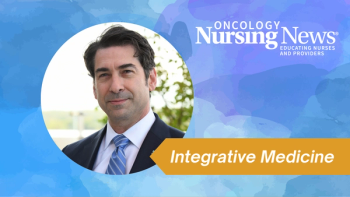
Start Survivorship Care Early, Expert Says
While there are multiple ways to create and deliver a survivorship care plan, clinicians should be thinking about these issues from the moment a patient is diagnosed.
There are key components to include in a survivorship care plan, and clinicians must work together to ensure the best possible outcomes for the patient, explained Michele Melisko, MD.
“I think the best place to start out in terms of talking about survivorship is to establish that you don’t actually have to be cured of your cancer to be a survivor, especially in an era where we have patients — even with stage IV disease – living many years,” Melisko, associate clinical professor in the department of medicine at the UCSF Helen Diller Family Comprehensive Cancer Center said.
Melisko said that a good cancer survivorship plan should include the following:
- Recommendations for appropriate treatment and screenings that can diagnose or prevent recurrence and/or secondary cancers.
- Assessment of medical and psychosocial late effects.
- Interventions that address and mitigate side effects from cancer treatment.
- Coordination between primary care physicians, oncologists, specialists, and patients.
Survivorship care plans come in all shapes and forms, and while it is still undecided which method is best, Melisko said that clinicians should sit down with their patients and discuss what aspects are most important to them. Perhaps they have anxiety or fear of recurrence, or maybe it is a physical symptom — like neuropathy – that is bothering them. It could be a list of aspects that a patient wants to improve.
“In providing survivorship care plans, we don’t really know what the optimal model to do it is,” Melisko said. “Maybe for some institutions, it’s a nurse practitioner-led model, and at other institutions, it’s a physician working with a nurse practitioner.”
At UCSF, Melisko explained that survivorship care starts from the moment a person becomes a patient. On the intake form, there are questions about the patients’ medical and social histories, PROMIS scores (which measure patient function), and psychosocial history.
UCSF researchers analyzed 428 patients who completed this form between 2014 and 2015. They found that more than half of the patients met the criteria to be referred to supportive care, which could include social work, onco-fertility specialists, genetic counseling, psycho-oncology, and more.
By working together, these clinicians can provide comprehensive care for the patient, hopefully leading to the best possible outcome.
“We believe that by identifying patient needs early, we consider survivorship to be from the time of diagnosis, and we’re hoping that we can actually improve patient-reported outcomes,” Melisko said.
Newsletter
Knowledge is power. Don’t miss the most recent breakthroughs in cancer care.




































